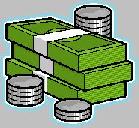
 |
|
| Financial Terms | |
| Intermediate Good |
|
Information about financial, finance, business, accounting, payroll, inventory, investment, money, inventory control, stock trading, financial advisor, tax advisor, credit.
Main Page: money, financial, stock trading, inventory control, financial advisor, business, investment, payroll, |
Definition of Intermediate Good
Intermediate GoodA good used in producing another good.
Related Terms:Value AddedThe value of a firm's output less the value of intermediate goods bought from other firms. Good deliveryA delivery in which everything - endorsement, any necessary attached legal papers, etc. - is in Good delivery and settlement proceduresRefers to PSA Uniform Practices such as cutoff times on delivery Good 'til canceledSometimes simply called "GTC", it means an order to buy or sell stock that is good until GoodwillExcess of the purchase price over the fair market value of the net assets acquired under purchase Intermediate-termTypically 1-10 years. Open (good-til-cancelled) orderAn individual investor can place an order to buy or sell a security. That  Cost of goods soldThe cost of merchandise that a company sold this year. For manufacturing companies, the cost of raw Cost of goods soldSee cost of sales. Cost of goods soldThe cost of the items that were sold during the current period. cost of goods manufactured (CGM)the total cost of the substitute goodan item that can replace another item to satisfy the same wants or needs Cost of goods soldThe accumulated total of all costs used to create a product or service, Finished goods inventorygoods that have been completed by the manufacturing GoodwillThe excess of the price paid to buy another company over the book value of Negative goodwillA term used to describe a situation in which a business combination Goodhart's LawWhatever measure of the money supply is chosen for application of the monetarist rule will soon begin to misbehave. Realizable Revenue A revenue transaction where assets received in exchange for goods andservices are readily convertible into known amounts of cash or claims to cash. Cost of goods soldThe charge to expense of the direct materials, direct labor, and Finished goods inventoryCompleted inventory items ready for shipment to GoodwillIntangible assets of a firm established by the excess of the price paid for the going concern over the value of its assets. contribution marginAn intermediate measure of profit equal to sales revenue Related to : financial, finance, business, accounting, payroll, inventory, investment, money, inventory control, stock trading, financial advisor, tax advisor, credit. |